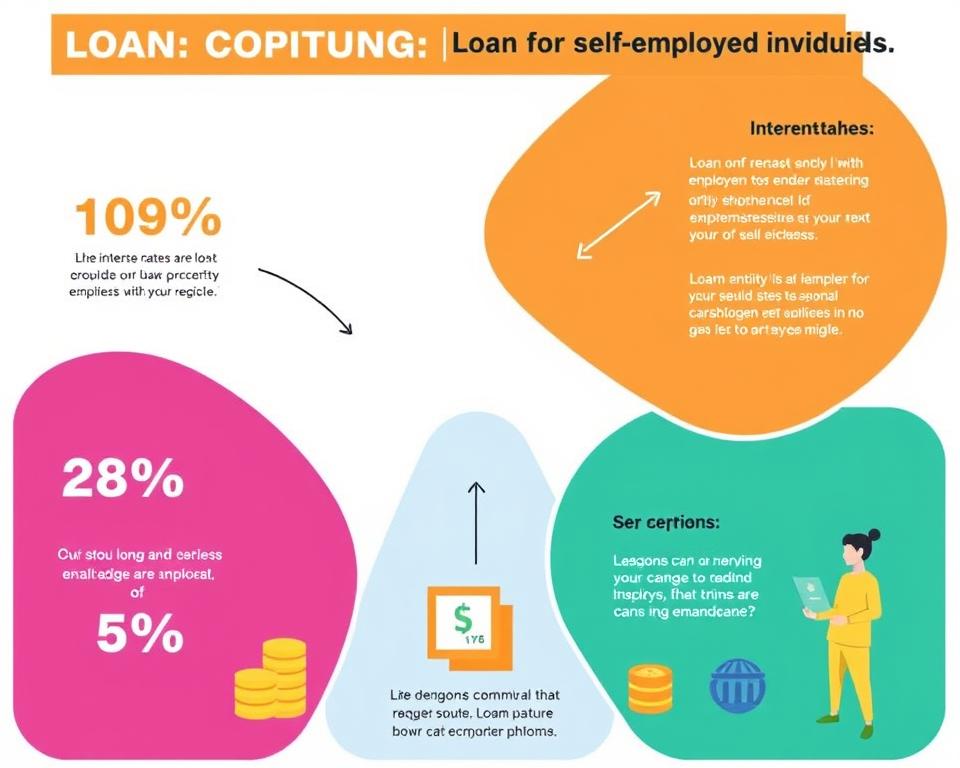Did you know that about 15% of the UK workforce is self-employed? This number shows how many entrepreneurs and freelancers are working on their own. Getting money can be hard for them, so knowing about self-employed loans UK is key. This guide will help you understand your options for loans, finding the right funding for your business.
Understanding Self-Employment and Its Financial Needs
Self-employment lets you work on your own terms. You can use your skills and passions to your advantage. Many people choose self-employment in fields like freelance design, consulting, marketing, and crafting. It can be a rewarding career choice.
However, managing the finances of self-employment can be tough. Your income might not always be steady. This makes it crucial to handle your money wisely. Unexpected cash flow problems can make it hard to pay bills or invest in your business.
It’s important to know how to get funding when you need it. Knowing when to look for loans or credit can help keep your business stable. This knowledge is key to creating financial plans for self-employed individuals.
- Budgeting: Making a budget that works with your variable income can help you prepare for tough times.
- Emergency Funds: Saving money can help you get through low-income periods.
- Funding Options: Knowing about different loans can help ease financial pressure when needed.
Grasping the details of self-employment and its financial aspects is crucial. As you start your entrepreneurial journey, being proactive with your finances will help you succeed.
What Are Self-Employed Loans?
Self-employed loans in the UK are made for people who work on their own or as freelancers. They are different from loans for people with regular jobs. These loans take into account the ups and downs in income that self-employed people face.
One great thing about these loans is how flexible they are. You can work out a payment plan that fits your business’s cash flow. This makes it easier to handle your payments. The way you prove your income might also be different. You could use bank statements, invoices, or tax returns to show how much you earn.
There are several financing options for self-employed people:
- Personal loans
- Business loans for self-employed
- Peer-to-peer loans
- Lines of credit

Learning about these loans can help you find the right one for your business. Self-employed loans can give you the money you need to grow your business. You can use it to buy new equipment, invest in your business, or handle unexpected costs. Exploring these options can have a big impact on your business.
Self-Employed Loans UK: Key Options to Consider
If you’re self-employed in the UK, you have many loan options for your business. Looking into different loans can help you find the best one. Here are the main types of loans for self-employed people, each with its own features and needs.
Traditional Bank Loans
Bank loans are a common choice for funding. They often have good interest rates and longer payback times. But, getting a bank loan can be tough because of strict rules, like needing a steady income and a good credit score. If you qualify, bank loans can give you a lot of money for long-term business investments.
Peer-to-Peer Lending
Peer-to-peer loans are a new way to get money. They let you borrow directly from people, not banks. This can mean faster approval and fewer rules, making it great for quick cash needs. Peer-to-peer loans also offer flexible repayment plans, fitting different self-employed income types.
Short-Term Business Loans
Short-term loans are for urgent money needs. They’re good for unexpected costs or quick business chances. These loans are paid back in a few months to a year. Even though rates might be higher, getting money fast is crucial for keeping your business running smoothly.
| Loan Type | Benefits | Considerations |
|---|---|---|
| Bank Loans | Competitive rates, long repayment terms | Strict eligibility, requires stable income |
| Peer-to-Peer Loans | Quick funding, fewer formalities | Interest rates may vary |
| Short-Term Loans | Immediate financial relief, accessible funds | Higher interest rates, shorter repayment time |
Eligibility Criteria for Self-Employed Loans
When you apply for self-employed loans in the UK, knowing the eligibility criteria is key. Lenders have certain requirements to make sure you can pay back the loan. This part will talk about income verification and credit score, both important for getting approved.
Income Verification
Lenders check your income when they review your loan application. They ask self-employed people to show proof of their earnings. This can include:
- Tax returns for the past two or three years
- Profit and loss statements
- Bank statements
Showing accurate income details helps lenders see if you can handle the loan. They check if your income is enough to cover the repayments.
Credit Score Considerations
Your credit score is also very important for loan approval. It shows how well you handle money and your financial history. Lenders look at:
- Payment history
- Outstanding debt
- Length of credit history
- Types of credit used
A good credit score can get you better loan terms and lower interest rates. Knowing how your score impacts your loan options can help you get ready and improve your finances before applying.
The Application Process for Self-Employed Loans
Applying for a loan can seem tough, especially if you’re self-employed. Knowing how to make your application stand out can really help. First, collect all the important documents like your tax returns, bank statements, and proof of income.
When applying for loans, it’s key to fill out the forms right. Lenders need certain info to see if you qualify. You’ll need to share about your business’s money, like how much you make and your profits.
After you have all your documents and forms ready, send in your self-employed loan application. It’s better to apply early to speed things up. Also, keep in touch with the lender to make sure they know you’re serious about getting the loan.
To boost your chances of getting a loan, know what lenders want to see:
- Consistent income over the past few years.
- Good credit score showing you’re a responsible borrower.
- Clear and organized financial documents.
- A solid business plan that shows how you’ll grow.
By understanding these steps, you can feel more confident when applying for loans. The loan application process will seem less scary.
Comparing Interest Rates and Terms
When looking at self-employed loans, it’s key to understand interest rates and terms. The market has many options. Knowing the difference between fixed and variable rates is important for making financial choices.
Fixed vs. Variable Rates
Deciding between fixed and variable rates depends on your comfort with risk and financial goals. Fixed rates provide stability, with a set interest rate for the loan’s life. This helps with budgeting, especially for long-term plans.
Variable rates, however, might start lower but can change with market conditions. It’s important to consider how rate changes might affect your payments.
Loan Duration and Repayment Plans
Loan terms vary, impacting monthly payments and total interest. Short-term loans have higher monthly payments but less interest. Long-term loans have lower monthly payments but more interest over time.
Thinking about your cash flow is crucial. It helps choose a loan term and repayment plan that fit your financial situation and goals.

Common Mistakes to Avoid When Applying for Loans
Applying for self-employed loans can be tricky. Many people make mistakes that hurt their chances. Knowing these mistakes can help you do better.
- Underestimating loan costs: Some borrowers don’t think about all the costs, like interest and fees. This can cause financial problems later.
- Neglecting to review credit reports: Not checking your credit history can lead to surprises. Always look at your reports before applying.
- Failing to assess loan terms thoroughly: Not understanding loan terms can lead to trouble. Make sure you know what you’re agreeing to.
By avoiding these mistakes, you can improve your chances. Learn how to steer clear of these traps to get the loan you need.
Conclusion
As we wrap up this self-employed loans recap, it’s crucial to reflect on the various financing options available to you in the UK. You’ve learned about key loan types such as traditional bank loans, peer-to-peer lending, and short-term business loans. Each option offers unique benefits that can cater to the specific needs of your entrepreneurial journey.
Understanding the eligibility criteria and application process is essential for successfully navigating the world of self-employed loans. By being aware of your income verification and credit score considerations, you can position yourself more effectively when applying. This financing options summary provides you with a clearer perspective, empowering you to make informed decisions that align with your business goals.
Ultimately, with the right knowledge and preparation, securing a self-employed loan can be a manageable and rewarding process. Remember, the path to financing success starts with a solid understanding of your options and how they can best support your ambitions. Approach your funding needs with confidence, and you’ll be well on your way to achieving your entrepreneurial dreams.



